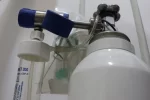
As you are reading this you are probably already familiar with respiratory therapists’ main duties as they are healthcare workers who are educated to treat patients with breathing and cardiopulmonary disorders.
A respiratory therapist is a person who will be in charge of disease prevention, respiratory wellness, and patient care related to emphysema, asthma, cardiac failure, chest trauma, and much more.
These professionals will be working with both premature infants to aging seniors with increasing rates of COPD and pneumonia.
It is a fact that nowadays thousands of Americans are hospitalized for respiratory complications and we consider it a wise idea to start looking for education which will lead you towards this career field.
The demand for respiratory therapists is extremely stronger and as a consequence, their salaries are booming as well.
Respiratory therapists have a very significant position within the healthcare team who diagnose, evaluate, and care for patients with cardiopulmonary problems, so it can be expected that their salaries are quite satisfying and stable.
Page Navigation
Salaries for Respiratory Therapists
The Bureau of Labor Statistics (BLS) is the organization that deals with the data related to salaries in the US states and they estimate that respiratory therapists earned an annual, average salary of $63,950 or $30.75/hour.
Of course, the salaries vary due to various factors, so the top respiratory therapists who boast several years of experience, a bachelor’s or master’s degree, and several specialty certifications can earn much more, approximately $86,980 or $41.82/hour.
How much they will earn also depends on the facility they work for and PayScale reported the average hourly wage for respiratory therapists who are employed in some of the nation’s largest healthcare systems:
- Lincare Inc.: $25/hour
- HCA, Inc.: $27/hour
- Kindred Healthcare: $29/hour
- Banner Health: $26/hour
- Dignity Health: $37/hour
- Apria Healthcare Group: $30/hour
The more experience you have, the higher average hourly wage you can expect to get and according to PayScale these are the averages:
- Less than one year: $23.07
- 1-4 years: $24.40
- 5-9 years: $26.61
- 10-19 years: $28.62
- 20+ years: $30.79
There are many other factors that can affect the salary of a respiratory therapist, and according to BLS statistics the type of facility in which they are employed one of them:
- Outpatient care centers: $82,050 ($39.45/hour)
- General medical and surgical hospitals: $64,120 ($30.83/hour)
- Specialty hospitals (e.g., rehabilitation facilities, hospice care, etc.): $65,260 ($31.37/hour)
- Skilled nursing facilities: $62,190 ($29.90/hour)
We would also like to mention that the top-paying states for respiratory therapists are the following and it is due to a higher cost of living in them:
- California: $83,920
- Washington D.C.: $80,130
- Nevada: $77,760
- New York: $79,900
- Hawaii: $76,610
The statistics also show the top-paying metro areas for respiratory therapists, and all of them are located in California:
- Salinas, CA: $101,520 ($48.81/hour)
- Sacramento, CA (includes Roseville, Arden, and Arcade): $98,810 ($47.51/hour)
- San Francisco, CA (includes Oakland and Hayward): $97,950 ($47.09/hour)
- San Jose, CA (includes Sunnyvale and Santa Clara): $97,37 ($46.81/hour)
Other Factors Affecting Respiratory Therapist Salaries
Signing, Relocation Bonuses
One of the factors that may affect your respiratory therapist’s salary includes impressive signing bonuses that often reach $5,000 or more.
Actually, there are many hospital HR departments that are increasing their recruitment reach and hire respiratory therapists from different cities and states offering excellent relocation bonuses which are hard not to accept.
Bachelor’s and Master’s Degrees
It is true that the associate’s degree is the minimum educational requirement to become licensed as a respiratory therapist in the U.S., but if you want your salary to be higher, you should consider becoming an RTs who have a bachelor’s degree or even master’s degree.
There are numerous reasons for this such as:
- RTs who possess bachelor’s degrees earn about $3,000 more than those with just an associate’s degree.
- Bachelor’s and master’s degrees in respiratory therapy can lead you to higher-paying positions like a manager, director, educator, or researcher, case manager, or clinical specialist.
- According to the U.S. Department of Health and Human Services reports, employers prefer hiring candidates with bachelor’s or master’s degree in respiratory therapy than those with only basic education.
- The constant development of the respiratory therapist profession will lead to the situation when the bachelor’s degree will become the new educational minimum.
The American Association for Respiratory Care (AARC) wants future respiratory therapists to possess or work toward a bachelor’s degree and they have called schools to award a minimum of a bachelor’s degree in respiratory care, but this has not come to fruition yet.
Still, it has affected both new and already established respiratory therapists with an associate’s degree to start thinking about gaining a bachelor’s degree.
Specialty Certifications
Another thing you can do to improve your salary is to reach a specialty certification to your resume.
Not only will it boost both your professional opportunities, but your earning potential as well.
If we take a look at the PayScale statistics and reports, respiratory therapists with neonatal intensive care unit (NICU) skills earned about 5% more and those who possess pediatric intensive care unit (PICU) skills or long-term care skills earned 2% more.
You can choose one or more of the additional certifications offered by the National Board for Respiratory Care (NBRC):
- Sleep Disorders Specialist (SDS)
- Neonatal/Pediatric Specialist (NPS)
- Adult Critical Care Specialty (ACCS)
Where the Respiratory Therapy Profession and Respiratory Therapist Salaries Are Headed
Being that this profession is experiencing constant development, in 2020, the AARC Board of Directors introduced the advanced practice respiratory therapist.
This is a new RT role and these professionals are supposed to work under a supervising licensed physician, unlike current RTs who are limited to a physician’s written order.
Upon reaching this newly defined role, RTs will be provided with far more practice autonomy, thus they will have new opportunities to boost their earning potential.
The reason why these new professional qualifications are introduced in the respiratory therapy profession is that it needs to continue to transform so as to be able to meet the needs of a constantly changing healthcare environment.








